苏教版 1-6小学英语语法复习要点
苏教版小学英语语法复习要点课件.doc
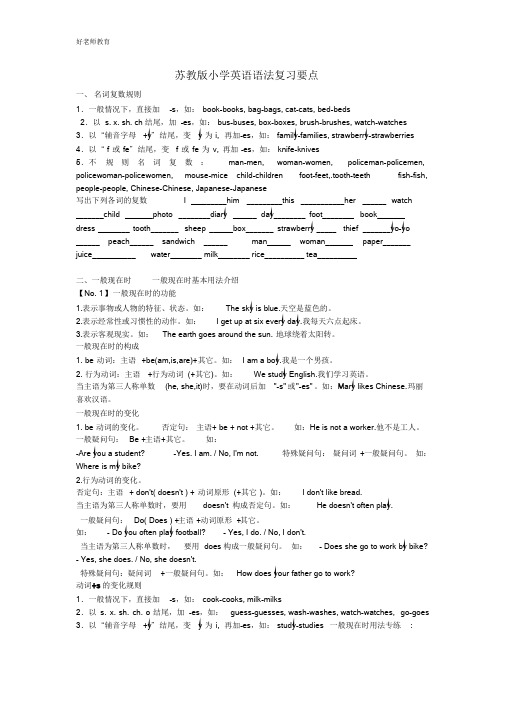
苏教版小学英语语法复习要点一、名词复数规则1.一般情况下,直接加-s,如:book-books, bag-bags, cat-cats, bed-beds2.以s. x. sh. ch结尾,加-es,如:bus-buses, box-boxes, brush-brushes, watch-watches 3.以“辅音字母+y”结尾,变y 为i, 再加-es,如:family-families, strawberry-strawberries 4.以“f 或fe”结尾,变 f 或fe 为v, 再加-es,如:knife-knives5.不规则名词复数:man-men, woman-women, policeman-policemen, policewoman-policewomen, mouse-mice child-children foot-feet,.tooth-teeth fish-fish, people-people, Chinese-Chinese, Japanese-Japanese写出下列各词的复数I _________him _________this ___________her ______ watch_______child _______photo ________diary ______ day________ foot________ book_______dress ________ tooth_______ sheep ______box_______ strawberry _____ thief _______yo-yo______ peach______ sandwich ______ man______ woman_______ paper_______ juice___________ water________ milk________ rice__________ tea__________二、一般现在时一般现在时基本用法介绍【No. 1】一般现在时的功能1.表示事物或人物的特征、状态。
苏教版小学英语语法复习要点[精品文档]
![苏教版小学英语语法复习要点[精品文档]](https://img.taocdn.com/s3/m/a6a004c0941ea76e58fa0494.png)
苏教版小学英语语法复习要点一、名词复数规则1.一般情况下,直接加-s,如:book-books, bag-bags, cat-cats, bed-beds2.以s. x. sh. ch结尾,加-es,如:bus-buses, box-boxes, brush-brushes, watch-watches3.以“辅音字母+y”结尾,变y为i, 再加-es,如:family-families, strawberry-strawberries4.以“f或fe”结尾,变f或fe为v, 再加-es,如:knife-knives5.不规则名词复数:man-men, woman-women, policeman-policemen, policewoman-policewomen, mouse-mice child-children foot-feet,.tooth-teeth fish-fish, people-people, Chinese-Chinese, Japanese-Japanese写出下列各词的复数I _________him _________this ___________her ______ watch _______child _______photo ________diary ______ day________ foot________ book_______ dress ________ tooth_______ sheep ______box_______ strawberry _____ thief _______yo-yo ______ peach______ sandwich ______ man______ woman_______ paper_______ juice___________ water________ milk________ rice__________ tea__________二、一般现在时一般现在时基本用法介绍【No. 1】一般现在时的功能1.表示事物或人物的特征、状态。
苏教版小学英语语法复习要点
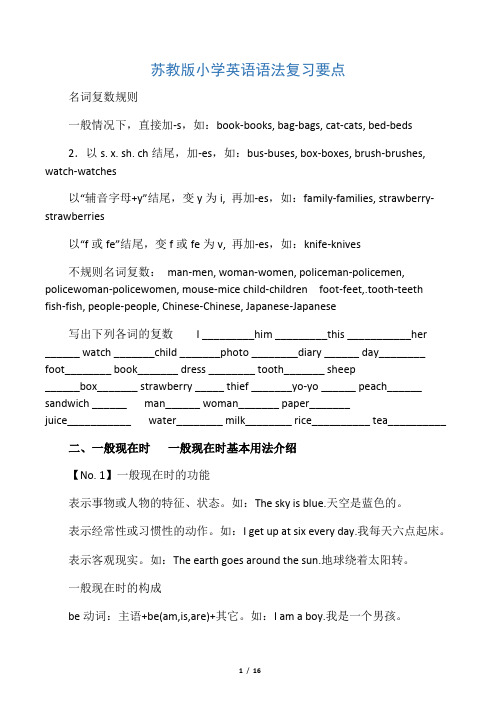
苏教版小学英语语法复习要点名词复数规则一般情况下,直接加-s,如:book-books, bag-bags, cat-cats, bed-beds2.以s. x. sh. ch结尾,加-es,如:bus-buses, box-boxes, brush-brushes, watch-watches以“辅音字母+y”结尾,变y为i, 再加-es,如:family-families, strawberry-strawberries以“f或fe”结尾,变f或fe为v, 再加-es,如:knife-knives不规则名词复数:man-men, woman-women, policeman-policemen, policewoman-policewomen, mouse-mice child-children foot-feet,.tooth-teethfish-fish, people-people, Chinese-Chinese, Japanese-Japanese写出下列各词的复数I _________him _________this ___________her______ watch _______child _______photo ________diary ______ day________ foot________ book_______ dress ________ tooth_______ sheep______box_______ strawberry _____ thief _______yo-yo ______ peach______ sandwich ______ man______ woman_______ paper_______juice___________ water________ milk________ rice__________ tea__________二、一般现在时一般现在时基本用法介绍【No. 1】一般现在时的功能表示事物或人物的特征、状态。
小学英语1-6年级必备基础语法要点(已整理)
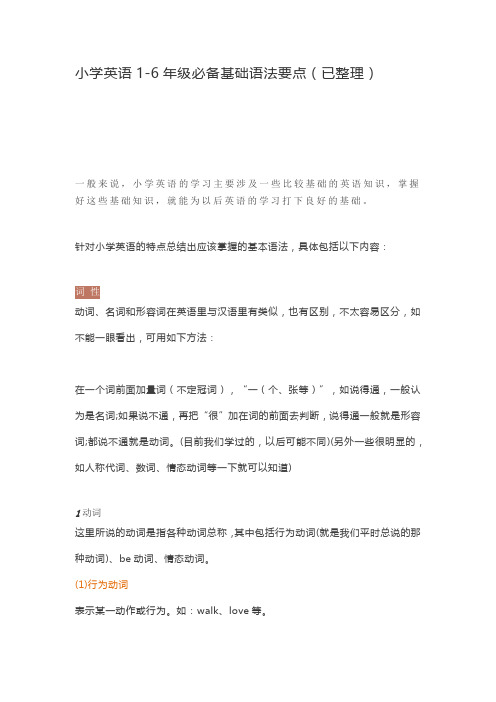
小学英语1-6年级必备基础语法要点(已整理)一般来说,小学英语的学习主要涉及一些比较基础的英语知识,掌握好这些基础知识,就能为以后英语的学习打下良好的基础。
针对小学英语的特点总结出应该掌握的基本语法,具体包括以下内容:动词、名词和形容词在英语里与汉语里有类似,也有区别,不太容易区分,如不能一眼看出,可用如下方法:在一个词前面加量词(不定冠词),“一(个、张等)”,如说得通,一般认为是名词;如果说不通,再把“很”加在词的前面去判断,说得通一般就是形容词;都说不通就是动词。
(目前我们学过的,以后可能不同)(另外一些很明显的,如人称代词、数词、情态动词等一下就可以知道)1动词这里所说的动词是指各种动词总称,其中包括行为动词(就是我们平时总说的那种动词)、be动词、情态动词。
(1)行为动词表示某一动作或行为。
如:walk、love等。
行为动词我们已学过它们的四种形式:原形、+s/es、+ed、+ing,(2)be动词a、口诀:我用am,你用are,is用在他她它,所有复数全用are。
b、肯定和否定句My hair is(not)long.Her eyes are(not)small.c、一般疑问句Am I a Chinese?Yes,you are.No,you aren’t.Are they American?Yes,they are.No,they aren’t.Is the cat fat?Yes,it is.No,it isn’t.我们现在学过的be动词大致分两类:is、am、are为一类,一般用于一般现在时、现在进行时和一般将来时中,was和were为另一类,一般用于一般过去时。
(3)情态动词情态动词也是一类特殊的动词,平时我们不把它说成是动词。
情态动词可以和行为动词同时出现在同一个句子中。
我们现在学过的情态动词有:can、must、should、would、may。
接触最多的是can。
情态动词后动词总是用原形。
苏教版16英语语法复习要点总结
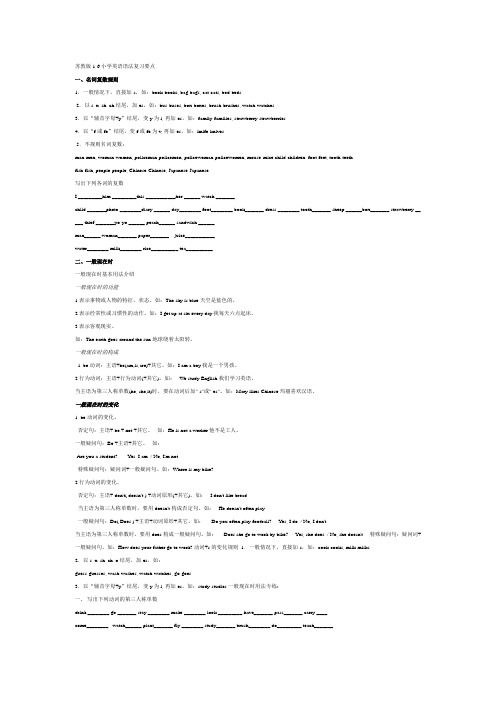
苏教版1-6小学英语语法复习要点一、名词复数规则1.一般情况下,直接加-s,如:book-books, bag-bags, cat-cats, bed-beds2.以s. x. sh. ch结尾,加-es,如:bus-buses, box-boxes, brush-brushes, watch-watches3.以“辅音字母+y”结尾,变y为i, 再加-es,如:family-families, strawberry-strawberries4.以“f或fe”结尾,变f或fe为v, 再加-es,如:knife-knives5.不规则名词复数:man-men, woman-women, policeman-policemen, policewoman-policewomen, mouse-mice child-children foot-feet,.tooth-teethfish-fish, people-people, Chinese-Chinese, Japanese-Japanese写出下列各词的复数I _________him _________this ___________her ______ watch _______child _______photo ________diary ______ day________ foot________ book_______ dress ________ tooth_______ sheep ______box_______ strawberry __ ___ thief _______yo-yo ______ peach______ sandwich ______man______ woman_______ paper_______ juice___________water________ milk________ rice__________ tea__________二、一般现在时一般现在时基本用法介绍一般现在时的功能1.表示事物或人物的特征、状态。
2023年苏教版小学英语语法总复习知识点归纳
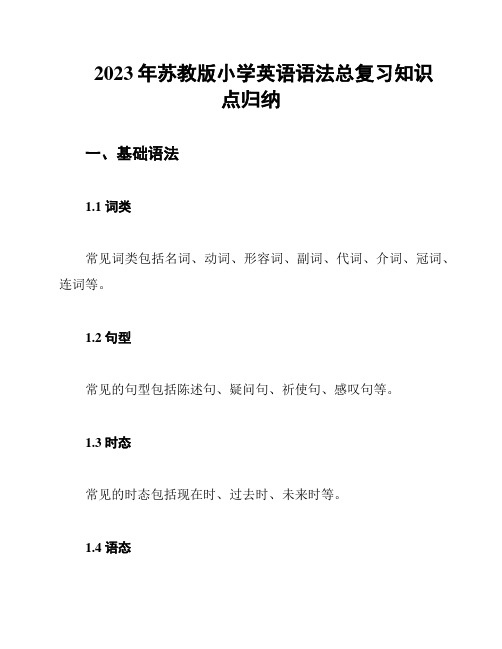
2023年苏教版小学英语语法总复习知识
点归纳
一、基础语法
1.1 词类
常见词类包括名词、动词、形容词、副词、代词、介词、冠词、连词等。
1.2 句型
常见的句型包括陈述句、疑问句、祈使句、感叹句等。
1.3 时态
常见的时态包括现在时、过去时、未来时等。
1.4 语态
常见的语态包括主动语态和被动语态。
1.5 数量词
常见的数量词包括one, two, three等基数词,以及first, second, third等序数词。
二、高级语法
2.1 名词性从句
名词性从句包括主语从句、宾语从句和表语从句。
2.2 倒装句
常见的倒装句包括完全倒装句和部分倒装句。
2.3 虚拟语气
虚拟语气包括与现在事实相反的虚拟语气、与过去事实相反的虚拟语气和与将来事实相反的虚拟语气。
2.4 直接引语和间接引语
直接引语和间接引语有不同的表达方式和语法结构。
三、常见错误
3.1 时态错误
时态错误包括时态不一致和时态误用。
3.2 句型错误
句型错误包括缺少主谓语、主谓不一致、句子结构过长等。
3.3 词汇错误
词汇错误包括拼写错误、用词不当、词性误用等。
四、研究建议
4.1 多读、多写、多听
语法是英语研究的基础,建议研究者多读、多写、多听,掌握
英语语法知识。
4.2 强化记忆
可以通过制作记忆卡片、做语法填空、做测试题等方式强化记忆,提高语法知识掌握程度。
4.3 查漏补缺
学习者在学习过程中应该随时查漏补缺,及时了解并纠正错误,提高英语语法水平。
(2021年整理)苏教版1-6小学英语语法复习及练习
(完整)苏教版1-6小学英语语法复习及练习编辑整理:尊敬的读者朋友们:这里是精品文档编辑中心,本文档内容是由我和我的同事精心编辑整理后发布的,发布之前我们对文中内容进行仔细校对,但是难免会有疏漏的地方,但是任然希望((完整)苏教版1-6小学英语语法复习及练习)的内容能够给您的工作和学习带来便利。
同时也真诚的希望收到您的建议和反馈,这将是我们进步的源泉,前进的动力。
本文可编辑可修改,如果觉得对您有帮助请收藏以便随时查阅,最后祝您生活愉快业绩进步,以下为(完整)苏教版1-6小学英语语法复习及练习的全部内容。
苏教版1—6小学英语语法复习及练习一、名词复数规则1.一般情况下,直接加—s,如:book—books,bag—bags, cat—cats,bed-beds 2.以s. x. sh。
ch结尾,加-es,如:bus-buses, box—boxes, brush—brushes,watch-watches以o结尾的名词,变复数时,有生命的后加es,例如:potato—-potatoes,tomato--tomatoes,hero——heroes,没有生命的加s,例如:radio—-radios,photo—photos,piano —pianos3.以“辅音字母+y”结尾,变y为i,再加-es,如:family—families, strawberry-strawberries4.以“f或fe"结尾,变f或fe为v, 再加—es,如:knife-knives 5.不规则名词复数:man-men,woman-women, policeman—policemen, policewoman-policewomen, mouse—mice child—childrenfoot-feet,.tooth-teethfish-fish, people-people, Chinese—Chinese, Japanese-Japanese写出下列各词的复数I _________him _________this ___________her ______ watch _______ch ild _______photo ________diary ______ day________ foot________ boo k_______ dress ________ tooth_______ sheep ______box_______ strawb erry _____ thief _______yo—yo ______ peach______ sandwich ______man______ woman_______ paper_______ juice___________water________ milk________ rice__________ tea__________ 二、一般现在时一般现在时基本用法介绍【No。
苏教版小学英语语法复习要点
苏教版小学英语语法复习要点一、名词复数规则1.一般情况下,直接加-s,如:book-books,bag—bags, cat—cats, bed-beds2.以s。
x。
sh. ch结尾,加—es,如:bus-buses, box-boxes,brush-brushes, watch—watches3.以“辅音字母+y”结尾,变y为i,再加—es,如:family—families, strawberry—strawberries4.以“f或fe"结尾,变f或fe为v, 再加—es,如:knife—knives5.不规则名词复数: man—men,woman—women,policeman—policemen, policewoman-policewomen,mouse-mice child—children foot—feet,。
tooth—teeth fish-fish,people—people,Chinese—Chinese,Japanese-Japanese写出下列各词的复数I _________him _________this ___________her ______ watch _______child _______photo ________diary ______ day________ foot________ book_______ dress ________ tooth_______ sheep ______box_______ strawberry _____ thief _______yo—yo ______ peach______ sandwich ______ man______ woman_______ paper_______ juice___________ water________ milk________ rice__________ tea__________二、一般现在时一般现在时基本用法介绍【No. 1】一般现在时的功能1.表示事物或人物的特征、状态。
苏教版英语语法复习要点总结
苏教版1-6小学英语语法复习要点一、名词复数规则1.一般情况下;直接加-s;如:book-books; bag-bags; cat-cats; bed-beds 2.以s. x. sh. ch结尾;加-es;如:bus-buses; box-boxes; brush-brushes; watch-watches3.以“辅音字母+y”结尾;变y为i; 再加-es;如:family-families; strawberry-strawberries4.以“f或fe”结尾;变f或fe为v; 再加-es;如:knife-knives5.不规则名词复数:man-men; woman-women; policeman-policemen; policewoman-policewomen; mouse-mice child-children foot-feet;.tooth-teethfish-fish; people-people; Chinese-Chinese; Japanese-Japanese写出下列各词的复数I _________him _________this ___________her ______ watch _______ child _______photo ________diary ______ day________ foot________ book_______ dress ________ tooth_______ sheep ______box_______ strawberry _____ thief _______yo-yo ______ peach______ sandwich ______man______ woman_______ paper_______ juice___________water________ milk________ rice__________ tea__________二、一般现在时一般现在时基本用法介绍一般现在时的功能1.表示事物或人物的特征、状态..如:The sky is blue.天空是蓝色的..2.表示经常性或习惯性的动作..如:I get up at six every day.我每天六点起床..3.表示客观现实..如:The earth goes around the sun.地球绕着太阳转..一般现在时的构成1. be动词:主语+beam;is;are+其它..如:I am a boy.我是一个男孩..2.行为动词:主语+行为动词+其它..如: We study English.我们学习英语..当主语为第三人称单数he; she;it时;要在动词后加"-s"或"-es"..如:Mary likes Chinese.玛丽喜欢汉语..一般现在时的变化1. be动词的变化..否定句:主语+ be + not +其它.. 如:He is not a worker.他不是工人..一般疑问句:Be +主语+其它.. 如:-Are you a student -Yes. I am. / No; I'm not.特殊疑问句:疑问词+一般疑问句..如:Where is my bike2.行为动词的变化..否定句:主语+ don't doesn't +动词原形+其它..如: I don't likebread.当主语为第三人称单数时;要用doesn't构成否定句..如: He doesn't often play.一般疑问句:Do Does +主语+动词原形+其它..如: - Do you often play football - Yes; I do. / No; I don't.当主语为第三人称单数时;要用does构成一般疑问句..如: - Does she go to work by bike - Yes; she does. / No; she doesn't. 特殊疑问句:疑问词+一般疑问句..如:How does your father go to work 动词+s的变化规则1.一般情况下;直接加-s;如:cook-cooks; milk-milks2.以s. x. sh. ch. o结尾;加-es;如:guess-guesses; wash-washes; watch-watches; go-goes3.以“辅音字母+y”结尾;变y为i; 再加-es;如:study-studies 一般现在时用法专练:一、写出下列动词的第三人称单数drink ________ go _______ stay ________ make ________ look _________ have_______ pass_______ carry ____come________ watch______ plant_______ fly ________ study_______ brush________ do_________ teach_______二、用括号内动词的适当形式填空..1. He often ________have dinner at home.2. Daniel and Tommy _______be in Class One.3. We _______not watch TV on Monday.4. Nick_______not go to the zoo on Sunday. 5. ______ they ________like the World Cup6. What _______they often _______do on Saturdays7. _______ your parents _______read newspapers every day 8. The girl _______teach us English on Sundays.9. She and I ________take a walk together every evening. 10. There ________be some water in the bottle. 11. Mike _______like cooking.12. They _______have the same hobby.13. My aunt _______look after her baby carefully. 14. You always _______do your homework well. 15. I _______be ill. I’m staying in bed.16. She _______go to school from Monday to Friday. 17. Liu Tao _______do not like PE.18. The child often _______watch TV in the evening.19. Su Hai and Su Yang _______have eight lessons this term.20. -What day _______be it today - It’s Saturday.三、按照要求改写句子1. Daniel watches TV every evening.改为否定句___________________________________________________2. I do my homework every day.改为一般疑问句;作否定回答____________________________________________________________________________________3. She likes milk.改为一般疑问句;作肯定回答___________________________________________________________________________________4. Amy likes playing computer games.改为一般疑问句;作否定回答 ____________________________________________________________________________________________5. We go to school every morning.改为否定句_______________________________________________________6. He speaks English very well.改为否定句___________________________________________________7. I like taking photos in the park.对划线部分提问8. John comes from Canada.对划线部分提问___________________________________________________9. She is always a good student.改为一般疑问句;作否定回答 __10. Simon and Daniel like going skating.改为否定句___________________________________________________五、改错划出错误的地方;将正确的写在横线上1. Is your brother speak English __________________2. Does he likes going fishing __________________3. He likes play games after class. __________________4. Mr. Wu teachs us English. __________________5. She don’t d o her homework on Sundays. _________________三、现在进行时1.现在进行时表示现在正在进行或发生的动作;也可表示当前一段时间内的活动或现阶段正在进行的动作..2.现在进行时的肯定句基本结构为be+动词ing.3.现在进行时的否定句在be后加not..4.现在进行时的一般疑问句把be动词调到句首..5.现在进行时的特殊疑问的基本结构为:疑问词不达意 + be + 主语 + 动词ing 但疑问词当主语时其结构为:疑问词不达意 + be + 动词ing 但疑问词当主语时其结构为:疑问词不达意 + be + 动词ing 动词加ing的变化规则1.一般情况下;直接加ing;如:cook-cooking2.以不发音的e结尾;去e加ing;如:make-making; taste-tasting 3.如果末尾是一个元音字母和一个辅音字母;双写末尾的辅音字母;再加ing;如:run-running; stop-stopping 现在进行时专项练习:一、写出下列动词的现在分词:play________ run__________ swim _________make__________ go_________ like________ write________ _ski___________ read________ have_________ sing ________ dance_________ put_________ see________ buy _________ love____________ live_______ take_________ come ________ get_________ stop_________ sit ________ begin________ shop___________二、用所给的动词的正确形式填空:1.The boy __________________ drawa picture now.2. Listen .Some girls _______________ singin the classroom .3. My mother _________________ cook some nice food now.4. What _____ you ______ do now5. Look . They _______________ have an English lesson .6.They ____________not ;water the flowers now.7.Look the girls ________________dance in the classroom .8.What is our granddaughter doing She _________listen to music.9. It’s 5 o’clock now. We ________havesupper now10.______Helen_____wash clothes Yes ;she is .三、句型转换:1. They are doing housework .分别改成一般疑问句和否定句______________________________________________________________________________________________________________2.The students are cleaning the classroom .改一般疑问句并作肯定和否定回答________________________________________________3;I’m playing the football in the playground对划线部分进行提问___________________________________________________________ 4.Tom is reading books in his study . 对划线部分进行提问___________________________________________________________四、将来时理论及练习一、概念:表示将要发生的动作或存在的状态及打算、计划或准备做某事..句中一般有以下时间状语:tomorrow; next dayweek; month; year ;soon; the day after tomorrow后天等..二、基本结构:①be going to + do;②will+ do.三、否定句:在be动词am; is; arel后加not或情态动词will后加not成won’t..例如:I’m going to have a picnic this afternoon.→ I’m not goingto have a picnic this afternoon.四、一般疑问句: be或will提到句首;some改为any; and改为or;第一二人称互换.. 例如:We are going to go on an outing this weekend.→ Are you going to go on an outing this weekend五、对划线部分提问..一般情况;一般将来时的对划线部分有三种情况..1. 问人..Who 例如:I’m going to New York soon. →Who’s going to New York soon.2. 问干什么..What do.例如: My father is goingto watch a race with me this afternoon. →What is your father goingto do with you this afternoon. 3. 问什么时候..When.例如:She’s goingto go to bed at nine. →When is she going to bed六、同义句:be going to = willI am going to go swimming tomorrow明天. = I will go swimming tomorrow. 填空..1. 我打算明天和朋友去野炊..I_____ _______ _________ have a picnic with my friends. I ________ have a picnic with my friends.2.下个星期一你打算去干嘛我想去打篮球..What ________ ________ _________ _________ _________ next Monday I _______ ______ _____ play basketball.What _________ you do next Monday I ________ play basketball.3. 你妈妈这个周末去购物吗是;她要去买一些水果.._____ your mother _______ ________ go shopping this ___________ Yes; she _________. She ______ ________ __________ buy some fruit.4. 你们打算什么时候见面..What time _______ you _________ __________ meet 改句子.. 5. Nancy is going to go camping.改否定 Nancy ________ going to go camping. 6. I’ll go and join them.改否定 I _______ go ______ join them.7. I’m going to get up at 6:30 tomorrow.改一般疑问句 ________ _______ ________ to get up at 6:30 tomorrow 8. We will meet at the bus stop at 10:30.改一般疑问句 _______ ________ meet at the bus stop at 10:30.9. She is going to listen to music after school.对划线部分提问 ________ _______ she ________ ________ _________ after school 10. My father and mother are going to see a play the day after tomorrow.同上 _________ _________ going to see a play the day after tomorrow. 用所给词的适当形式填空..11. Today is a sunny day. We ___________________ have a picnic this afternoon.12. My brother _______________ go to Shanghai next week.13. Tom often ______________go to school on foot. But today is rain. He ______________ go to school by bike.14. What do you usually do at weekends I usually __________ watch TV and ____________catch insects15. It’s Friday today. What _____she _________ do this weekend She ______________ watch TV and _____________ catch insects.16. What ___________ d0 you do last Sunday I ____________ pick apples on a farm. What ______________ do next Sunday I ______________ milk cows. 17. Mary ____________ visit her grandparents tomorrow.18. Liu Tao ____________ fly kites in the playground yesterday. 19. David ______________ give a puppet show next Monday. 20. I ________________ plan for my study now.五、一般过去时1.一般过去时表示过去某个时间发生的动作或存在的状态;常和表示过去的时间状语连用..一般过去时也表示过去经常或反复发生的动作感谢.. 2.Be动词在一般过去时中的变化:⑴am 和is在一般过去时中变为was..was not=wasn’t⑵are在一般过去时中变为were..were not=weren’t⑶带有was或were的句子;其否定、疑问的变化和is; am; are一样;即否定句在was或were后加not;一般疑问句把was或were调到句首.. 3.句中没有be动词的一般过去时的句子否定句:didn’t +动词原形;如:Jim didn’t go home yesterday. 一般疑问句:在句首加did;句子中的动词过去式变回原形.. 如:Did Jim go home yesterday特殊疑问句:⑴疑问词+did+主语+动词原形如: What did Jim do yesterday⑵疑问词当主语时:疑问词+动词过去式如:Who went to home yesterday 动词过去式变化规则:1.一般在动词末尾加-ed;如:pull-pulled; cook-cooked2.结尾是e加d;如:taste-tasted3.末尾只有一个元音字母和一个辅音字母的重读闭音节;应双写末尾的辅音字母;再加-ed;如:stop-stopped4.以“辅音字母+y”结尾的;变y为i; 再加-ed;如:study-studied 过去时练习写出下列动词的过去式is\am_________ fly_______ plant________ are ________ drink_________ play_______ go________ make ________ does_________ dance________ worry________ ask _____ taste_________ eat__________draw________ put ______ throw________ kick_________ pass_______ do ________Be动词的过去时练习1一、用be动词的适当形式填空1. I _______ at school just now.2. He ________ at the camp last week.3. We ________ students two years ago.4. They ________ on the farm a moment ago.5. Yang Ling ________ eleven years old last year.6. There ________ an apple on the plate yesterday7. There ________ some milk in the fridge on Sunday.8. The mobile phone _______ on the sofa yesterday evening.二、句型转换1. It was exciting.否定句:________________________________________________一般疑问句:____________________________________________肯、否定回答:__________________________________________2. All the students were very excited.否定句:________________________________________________一般疑问句:____________________________________________肯、否定回答:__________________________________________3. They were in his pocket.否定句:________________________________________________一般疑问句:____________________________________________肯、否定回答:__________________________________________Be 动词的过去时练习2一、用be动词的适当形式填空1. I ______ an English teacher now.2. She _______ happy yesterday.3. They _______ glad to see each other last month.4. Helen and Nancy ________ good friends.5. The little dog _____ two years old this year.6. Look; there ________ lots of grapes here.7. There ________ a sign on the chair on Monday..8. Today _____ the second of June. Yesterday ______ the first of June. It _____ Children’s Day. All the students ______ very excited.二、句型转换1. There was a car in front of the house just now.否定句:________________________________________________一般疑问句:____________________________________________肯、否定回答:__________________________________________肯、否定回答:__________________________________________三、中译英1.我的故事书刚才还在手表旁边..___________________________________________________________ 2.他们的外套上个礼拜放在卧室里了..3.一会以前花园里有两只小鸟..___________________________________________________________行为动词的过去时练习1 一、用行为动词的适当形式填空1. He _________ live in Wuxi two years ago.2. The cat ________ eata bird last night. 3. We _______ have a party last Halloween.4. Nancy ________ pick up oranges on the farm last week.5. I ________ make a model ship with Mike yesterday.6. They ________ play chess in the classroom last PE lesson.7. My mother _______ cook a nice food last Spring Festival.8. The girls ________ sing and _______ dance at the party.二、句型转换1. Su Hai took some photos at the Sports day.否定句:________________________________________________一般疑问句:____________________________________________肯、否定回答:_________________________________________ _2. Nancy went to school early.否定句:________________________________________________一般疑问句:____________________________________________肯、否定回答:__________________________________________3. We sang some English songs.否定句:________________________________________________一般疑问句:____________________________________________肯、否定回答:__________________________________________行为动词的过去时练习2一、用be动词的适当形式填空1. I ______ watch a cartoon on Saturday.2. Her father _______ read a newspaper last night.3. We _________ to zoo yesterday; we _____ to the park. go4. ______ you _______ visit your relatives last Spring Festival5. ______ he _______ fly a kite on Sunday Yes; he ______.6. Gao Shan _______ pull up carrots last National Day holiday.7. I ____________ sweep the floor yesterday; but my mother ______.8. What ______ she _______ find in the garden last morning She __________ find a beautiful butterfly.二、句型转换1. They played football in the playground.否定句:________________________________________________一般疑问句:____________________________________________肯、否定回答:__________________________________________3. We sang some English songs.否定句:________________________________________________一般疑问句:____________________________________________肯、否定回答:__________________________________________三、中译英1. 格林先生去年住在中国..2. . 昨天我们参观了农场..3. 他刚才在找他的手机..过去时综合练习1一、用动词的适当形式填空1. It ______ be Ben’s birthday last Friday.2. We all ______ have a good time last night.3. He ________ jump high on last Sports Day.4. Helen ________ milk a cow on Friday.5. She likes ______ newspapers; but she ______ a book yesterday. read6. He _______ football now; but they _______ basketball just now. play7. Jim’s mother _________ plant trees just now.8. _______ they ________ sweep the floor on Sunday No; they _____.9. I _______ watch a cartoon on Monday. 10. We ___________ go to school on Sunday1. 我们上周五看了一部电影.._________________________________________________________2. 他上个中秋节走亲访友了吗是的.._________________________________________________________3. 你们上个儿童节做了什么我们参观了动物园.._________________________________________________________4. 你上周在哪儿在野营基地.._________________________________________________________过去时综合练习2Name ____________ No. ______ Date __________一、用动词的适当形式填空1. It _____ be the 2nd of November yesterday Mr White ________ go to his office by car.2. Gao Shan ________ put the book on his head a moment ago.3. Don’t ______ the house. Mum _______ it yesterday. clean4. What ____ you ______ just now I _______ some housework. do5. They _________ make a kite a week ago.6. I want to ______ apples. But my dad _______ all of them last month. pick7. _______ he ______ the flowers this morning Yes; he _____. water8. She ____ be a pretty girl. Look; she _____ do Chinese dances.9. The students often _________ draw some pictures in the art room.10.What ______ Mike do on the farm He ________ cows. milk二、中译英1. 他的朋友在照看他的弟弟.._________________________________________________________ 2. 去年端午节我们没去看了龙舟比赛.._________________________________________________________ 3. 他在音乐课上拉小提琴了吗不;没有.._______________________________________________。
- 1、下载文档前请自行甄别文档内容的完整性,平台不提供额外的编辑、内容补充、找答案等附加服务。
- 2、"仅部分预览"的文档,不可在线预览部分如存在完整性等问题,可反馈申请退款(可完整预览的文档不适用该条件!)。
- 3、如文档侵犯您的权益,请联系客服反馈,我们会尽快为您处理(人工客服工作时间:9:00-18:30)。
苏教版 1-6小学英语语法复习要点 一、名词复数规则 1.一般情况下,直接加 -s ,如:book-books, bag-bags, cat-cats, bed-beds
2.以 s. x. sh. ch结尾,加 -es ,如:bus-buses, box-boxes, brush-brushes, watch-watches 3.以“辅音字母 +y”结尾,变 y 为 i, 再加 -es ,如:family-families, strawberry-strawberries 4.以“ f 或 fe ”结尾,变 f 或 fe 为 v, 再加 -es ,如:knife-knives 5.不规则名词复数: man-men, woman-women, policeman-policemen, policewoman-policewomen, mouse-mice child-children foot-feet,.tooth-teeth fish-fish, people-people, Chinese-Chinese, Japanese-Japanese 写出下列各词的复数 I _________him _________this ___________her ______ watch _______
child _______photo ________diary ______ day________ foot________ book_______ dress ________ tooth_______ sheep ______box_______ strawberry __ ___ thief _______yo-yo ______ peach______ sandwich ______ man______ woman_______ paper_______ juice___________ water________ milk________ rice__________ tea__________ 二、一般现在时 一般现在时基本用法介绍 一般现在时的功能
1. 表示事物或人物的特征、状态。如:The sky is blue.天空是蓝色的。
2. 表示经常性或习惯性的动作。如:I get up at six every day.我每天六点起床。 3. 表示客观现实。 如:The earth goes around the sun.地球绕着太阳转。 一般现在时的构成 1. be动词:主语 +be(am,is,are)+其它。如:I am a boy.我是一个男孩。
2. 行为动词:主语 +行为动词 (+其它 ) 。如: We study English.我们学习英语。 当主语为第三人称单数 (he, she,it)时,要在动词后加 "-s" 或 "-es" 。如:Mary likes Chinese.玛丽喜欢汉语。 一般现在时的变化 1. be动词的变化。
否定句:主语 + be + not +其它。 如:He is not a worker.他不是工人。 一般疑问句:Be +主语 +其它。 如: -Are you a student? -Yes. I am. / No, I'm not.
特殊疑问句:疑问词 +一般疑问句。如:Where is my bike? 2. 行为动词的变化。
否定句:主语 + don't( doesn't ) +动词原形 (+其它 ) 。如: I don't like bread. 当主语为第三人称单数时,要用 doesn't 构成否定句。如: He doesn't often play. 一般疑问句:Do( Does ) +主语 +动词原形 +其它。如: - Do you often play football? - Yes, I do. / No, I don't.
当主语为第三人称单数时,要用 does 构成一般疑问句。如: - Does she go to work by bike? - Yes, she does. / No, she doesn't. 特殊疑问句:疑问词 +一般疑问句。如:How does your father go to work? 动词 +s的变化规则 1.一般情况下,直接加 -s ,如:cook-cooks, milk-milks 2.以 s. x. sh. ch. o结尾,加 -es ,如: guess-guesses, wash-washes, watch-watches, go-goes 3.以“辅音字母 +y”结尾,变 y 为 i, 再加 -es ,如:study-studies 一般现在时用法专练 : 一、 写出下列动词的第三人称单数 drink ________ go _______ stay ________ make ________ look _________ have_______ pass_______
carry ____ come________ watch______ plant_______ fly ________ study_______ brush________ do_________ teach_______ 二、用括号内动词的适当形式填空。 1. He often ________(have) dinner at home. 2. Daniel and Tommy _______(be) in Class
One. 3. We _______(not watch) TV on Monday. 4. Nick _______(no t go) to the zoo on Sunday. 5. ______ they ________(like) the World Cup? 6. What _______they often _______(do) on Saturdays? 7. _______ your parents _______(read) newspapers every day? 8. The girl _______(teach) us English on Sundays. 9. She and I ________(take) a walk together every evening. 10. There ________(be) some water in the bottle. 11. Mike _______(like) cooking. 12. They ____ ___(have) the same hobby. 13. My aunt _______(look) after her baby carefully. 14. You always _______(do) your homework well. 15. I _______(be) ill. I’m staying in bed. 16. She _______(go) to school from Monday to Friday. 17. Liu Tao _______(do) not like PE. 18. The child often _______(watch) TV in the evening. 19. Su Hai and Su Yang _______(have) eight lessons this term. 20. -What day _______(be) it today? - It’ s Saturday. 三、按照要求改写句子 1. Daniel watches TV every evening.(改为否定句 )
___________________________________________________ 2. I do my homework every day.(改为一般疑问句,作否定回答 ) ________________________________________________________ ____________________________ 3. She likes milk.(改为一般疑问句,作肯定回答 ) _______________________________________________________ ____________________________ 4. Amy likes playing computer games.(改为一般疑问句,作否定回答 ) ________________________________________________________ ____________________________________ 5. We go to school every morning.(改为否定句 ) _______________________________________________________ 6. He speaks English very well.(改为否定句 ) ___________________________________________________ 7. I like taking photos in the park.(对划线部分提问 ) 8. John comes from Canada.(对划线部分提问 ) ___________________________________________________ 9. She is always a good student.(改为一般疑问句,作否定回答 ) __ 10. Simon and Daniel like going skating.(改为否定句 ) ___________________________________________________ 五、改错 (划出错误的地方,将正确的写在横线上 ) 1. Is your brother speak English? __________________ 2. Does he likes going fishing? __________________ 3. He likes play games after class. __________________
